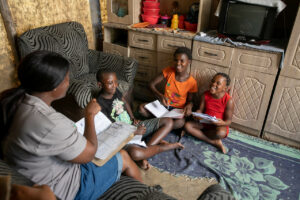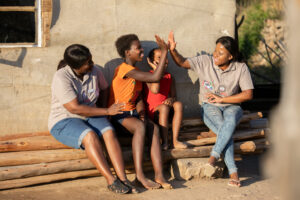m2m Marks International Day of the African Child
Today is the Day of the African Child—a day that marks progress in advancing children’s basic human rights, while highlighting the challenges youth continue to face across Africa. The day was first observed in 1991, to commemorate the 1971 student uprisings in Soweto, South Africa, when armed police responded with force against more than 20,000 students, who took to the streets in protest against a discriminatory education system, and South Africa’s apartheid regime.
Challenges Faced
Some of the challenges children and adolescents face in sub-Saharan Africa are the result of the decades-long HIV/AIDS epidemic that, despite global progress, continues to take a heavy toll on the continent. According to a USAID report, over the last 30 years, an estimated 17 million children lost one or both parents to AIDS, and 90% of these children live in sub-Saharan Africa. Each day, more than 350 children still contract HIV across the region during pregnancy, birth, or unsafe breastfeeding. Around 4,200 adolescent girls and young women aged 15–24 years became infected with HIV every week (UNAIDS). COVID-19 exacerbated the challenges facing children and adolescents, with disruptions to health services and unprecedented school closures.
Part of the Solution

m2m Mentor Mother engaging with children during a household assessment visit in Mpumalanga
mothers2mothers (m2m) is committed to ensuring that every child stays healthy and thrives, by integrating services to protect and improve the health and development of infants and children (ages 0-9) into our core Peer Mentor programme. Our frontline staff, who are called Mentor Mothers, work to identify at risk children in health facilities and communities in an effort to tackle unacceptably low rates of paediatric testing and treatment. When a child tests positive, Mentor Mothers provide education and support to their families so they are started on treatment and stay in care. They also educate parents and caregivers about early learning stimulation, responsive and playful parenting, immunisations, nutrition, safety, and protection, and provide tailored services to adolescents.
This work includes serving the needs of some of Africa’s most vulnerable citizens. In Mpumalanga province in South Africa—a region with widespread poverty and severely affected by the HIV/AIDS epidemic—m2m’s Children and Adolescents are My Priority (CHAMP) programme focuses on the needs of orphaned and other vulnerable children and adolescents (OVCAs) and their caregivers, who are exposed to, living with, or made vulnerable by HIV and AIDS.
Funded by the U.S. President’s Emergency Plan for AIDS Relief (PEPFAR) through the U.S. Agency for International Development (USAID)—and implemented in partnership with Grassroots Soccer and Zoë-Life—Mentor Mothers provide OVCAs with home-based services, including HIV education, screenings for disease and violence, and referrals to a range of health and social services. CHAMP also monitors school attendance, supports households to become stronger economically, and capacitates families and the broader community to protect and adequately care for these young people.
Meet Esther

Esther Mtsweni, far right, and another Mentor Mother engage with children during a household visit
“I recently referred a case of two double orphaned children—aged seven and nine—who live with their grandmother. They did not have birth certificates, which meant that they could not enroll in school or receive any financial assistance from government. I travelled with them and their grandmother to the Department of Home Affairs offices, so they could apply for their birth certificates,” says Esther Mtsweni, a former m2m client, who is now employed by m2m under the CHAMP project as a Linkage Assistant. She is responsible for ensuring that OVC cases identified by Mentor Mothers in the community are referred to the relevant government department or partner for additional support.
“While we wait on the birth certificates, we also referred them to Child Welfare so they can get a letter for school enrolment. Right now, they also receive food parcels from Child Welfare and the children have finally started primary school. This is what we stand for; working in close partnership with government and other stakeholders to uphold the most basic child rights,” Esther adds.
Between October 2021 and April 2022, CHAMP served a total of 81,115 OVCAs attaining 80% of their annual target of 101,519 clients living in the three districts supported by CHAMP: Ehlanzeni, Nkangala, and Gert Sibande.
On this Day of the African Child, we hope you will join us in our efforts to support Africa’s children. Together, we can continue to grow and innovate our programme and services to improve the health and well-being of children and adolescents to create a truly HIV-free generation.






















